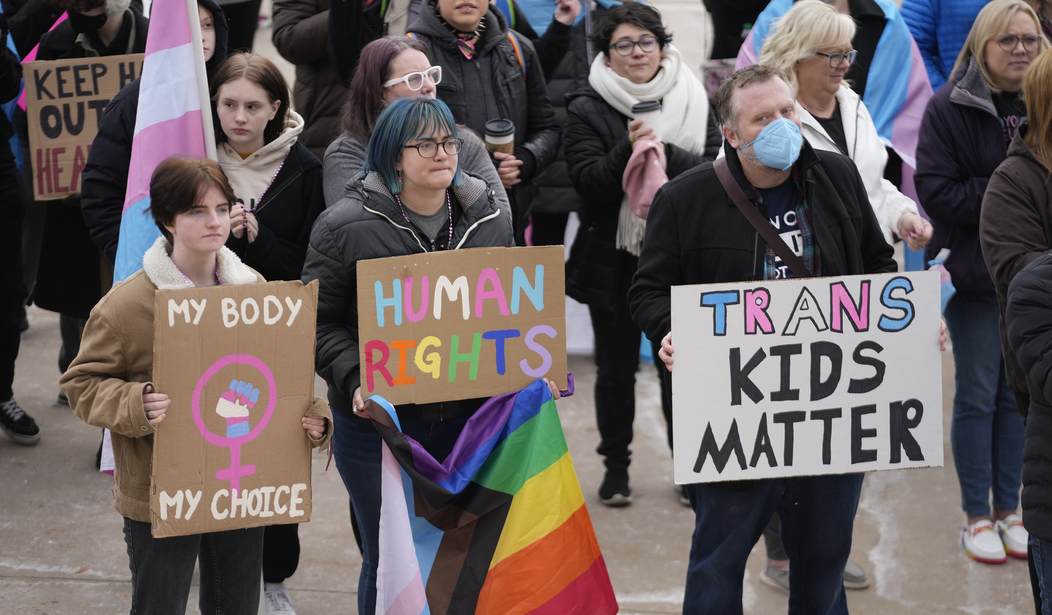Yet another poll has surfaced showing that most people, at least in Texas, oppose the use of puberty blockers and hormone treatments for children experiencing gender dysphoria.
The results are not surprising, but it does raise a question about the overall debate over “gender-affirming care.” If there are more people who oppose these practices, then why has the effort to trans children and promote gender ideology to kids been so successful?
In a recent article on his Substack, journalist Christopher Rufo presented findings from a Manhattan Institute poll showing that a majority of Texas voters are against prescribing puberty blockers and hormone treatments for minors.
The survey found that “Nearly seven in ten likely Texas voters say that children should not be allowed to receive medical treatments to move toward transitioning genders before the age of 18.”
The rest of the data is striking, with 76 percent of Texans believing that kids are not old enough to consent to puberty-blocking treatments, while 82 percent have the same opinion of “gender-affirming” surgeries. Only a small fraction, ten percent and seven percent respectively, disagreed with these positions.
"A majority (52 percent) feel that doctors who unlawfully bill Medicaid for pediatric gender transitions should be prosecuted to the fullest extent of the law," the article adds.
Texas is a red state, but even a significant chunk of Democrats did not approve of “gender-affirming care” for children. The poll found that 39 percent of Democrats oppose puberty blockers and hormone treatments for kids, while 40 percent supported it.
Of course, those on the pro-trans side of the debate would point out that Texas leans more conservative. However, these findings are not out of line with national polling on the matter. In May 2023, a Washington/KFF poll revealed that 68 percent of adults oppose puberty blockers for children experiencing gender confusion.
Those who support “gender-affirming care” for children are clearly in the minority, yet they are still driving the agenda. They have managed to infuse gender ideology in K-12 schools while using medical facilities to help transition minors.
Much of this is because most people did not know that this ideology was being pushed this aggressively in the school system until a few years ago when the issue blew up. Unfortunately, progressives had plenty of time to pursue this agenda without the knowledge of parents.
Still, these results are a promising sign that the resistance to the gender agenda is growing. Rufo noted that “a majority of Texans think that lawmakers around the country should be doing more to prevent minors from receiving medical treatments to move toward transitioning genders.” In many states, lawmakers have passed laws outlawing these treatments for children in most cases.
Even further, those fighting to protect children are using lawfare against those who are targeting kids experiencing gender dysphoria. Detransitioners have filed several lawsuits against medical facilities that rushed them into taking puberty blockers without considering alternatives. Given that studies show most children growing out of their gender dysphoria without the use of medical treatments, it does not make sense that a medical professional would pressure parents to allow their children to be subject to these procedures.
It is also worth noting that it seems that more people are being educated on the issue – especially with multiple studies emerging over recent years showing that puberty blockers and hormone treatments do not aid children with their mental health issues. They have also shown that “gender-affirming care” actually causes harm to these individuals – especially after they become adults and regret their decisions.
It is only a matter of time before we see a tipping point in this country similar to what has happened in the United Kingdom, which recently announced that it was moving away from the “gender-affirming care” model and relying more on talk therapy and other methods. The challenge now is showing the rest of the country how damaging this trend has become so that more people get off the sidelines and join the fight.













